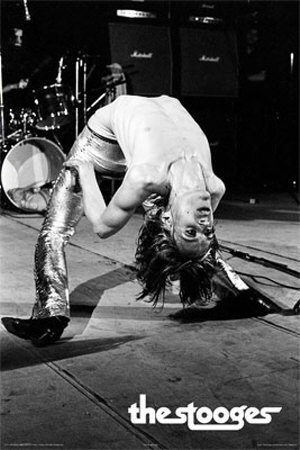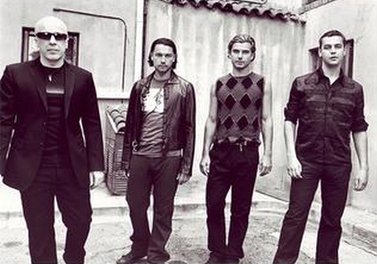
Bu topraklarda doğan ilk ve tek rock star aramızdan ayrılalı 7 yıl olmuş. Ölümün kimseye affı yok. Tom Morello "Farewell to Joe Strummer" diye güzel bir yazı yazmış üstadın onuruna:
- The first time I heard of the Clash was in high school. I was working on the school newspaper, and one day a fellow named Dave Vogel came in with a copy of London Calling that he was showing off to anybody who was willing to listen. I thought the cover of the album was really cool, and asked him "is it heavy metal?" He said "no, but it's really great." I doubted him, but asked if I could borrow it, and I made myself a cassette copy. This low-grade Dolby-suffering cassette tape burned its way into my head, heart and soul, and the Clash soon became my favorite band.
At the time, I was playing in a punk rock band. Most of our songs were amusing, funny ditties with names like "She Eats Razors" and "Beat Me, Whip Me, Make Me Feel Cheap." A week after my first listen to London Calling, I penned the first political song of my life, a song called "Salvador Death Squad Blues," a rocking commentary on the Reagan administration's egregious practices in Central America. Shortly thereafter, there was a rebellion at the school paper. The conservative teacher didn't want us writing articles about apartheid, or U.S. support of death squads, or the fact that the dean was a dick. There was a mass exodus from the paper and a very popular underground paper was born called "The Student Pulse." The Clash pushed me into making political music and taking a political stand as a teenager.
Later that year, I got the chance to see the Clash at the Aragon Ballroom in Chicago, and was totally blown away. Not only were they the greatest live band of all time, but they also cured my musical inferiority complex. Before this show, I had thought that you had to have a $10,000 Les Paul and a huge wall of Marshall amplifiers in order to make "real" rock and roll music. But Joe Strummer had the same cheap little Music Man amp that I did. It was just sitting on a chair, much like my amp sat on a chair at my high school band's rehearsals. And yet they were making the most passionate and compelling music I had ever heard. A lot of kids left the hall that night knowing that they could do it too. The Axis of Justice motto, "the future is unwritten" is taken from a t-shirt I purchased that night.
On the early Rage Against the Machine tours, Clash tapes and bootlegs were always the most important part of my on-the-road music collection. They were a tremendous inspiration and consolation on those long, freezing European bus rides. And in listening to those crappy quality bootleg tapes, you could still always hear in Joe Strummer's voice that he did truly believe that the world could be changed with a three minute song, and that each night, he was up there not playing for ego, self-gratification, money or rock star glory. He was playing with the determination to save the soul of everybody in the room, his included.
The Sex Pistols were the flashpoint that made the world notice punk rock. The Clash, sewed politics into punk and rock and roll irreversibly. And Joe Strummer was the heart, the soul, and the conscience of the Clash.
No one had more of a true punk rock look than Joe Strummer. I always thought he had the greatest no-sell-out teeth in the business. The Clash were great because they realized that it did not in any way impinge their integrity to be a "performing" rock and roll band, and they looked, sounded and dressed the part of the rebel rockers they were.
One thing I always admired about the Clash was their great attention to what it meant to be a band, outside of the music. They would have countless meetings where they would discuss their lives, their opinions, their political views, what they meant to each other, and what it was important for them to say in their songs and how to maintain the highest level of integrity and commitment to continuing to be "the only band that matters."
Joe was also insistent on choosing singles not based necessarily on their potential hit value, but rather based on their relevance. The Clash wrote and released "The Call Up" as a single in response to the reinstitution of draft registration in the United States. It was a huge issue at the time and with the shadows of Vietnam creeping across Central America, a song like "The Call Up," with its poetic and brutally true lyrics helped a lot of young people make up their minds about what they would do if a draft actually came.
I've always been really pissed at the way that the British press turned its back on the Clash. There seemed to be a real petty jealousy that British publications had towards the Clash after their debut album. Once the rest of the world caught on to their hometown little secret, they stomped their feet like spoiled brats and turned their backs on such amazing albums as London Calling and Sandinista (The London Calling album, by the way, was voted the album of the decade by Rolling Stone magazine).
The Clash always resisted the temptation to reunite for the big money. And their reasons spoke to the greatness of the band and the people in it. It wasn't out of some elitist pomposity that they dare not reconvene for fear of besmirching their "legend," but rather because their friend and drummer Topper Headon, a heroin addict, wasn't healthy enough to do it. And as Joe says near the end of the great Clash documentary "Westway to the World," a band's chemistry is everything. Joe gives a tearful speech lamenting the dismissing of first Topper Headon and then Mick Jones. It's a speech worth listening to, because it truly is a band chemistry that matters. There is a potency to that classic Clash line-up that, had they stayed the course, it is likely that to this day, U2 might still be opening for them.
Throughout my time in Rage Against the Machine, journalists would always ask the question, "what the hell is a band with the politics of Rage doing on Epic Records?" I would often answer with long and flowery sermons about spreading an important message around the globe. But I really could have answered with two words: The Clash. I was energized and politicized and changed by the Clash. And the reason I heard about them was because Dave Vogel bought London Calling at Musicland Records at the local Hawthorne Mall in tiny Libertyville, Illinios. And the reason Dave could get his hands on this album at a nearby mall was because the band was on Epic Records. If in the history of Rage Against the Machine we were able to energize or politicize one person in the same way that the Clash effected me, the decision to sign with Epic Records was not just well worth it, but was crucial.
A couple years ago, I had the opportunity to play on a Joe Strummer record. He was doing a song for the South Park soundtrack, and Rick Rubin asked me to come down and play guitar, because the guy that they had doing it (who incidentally plays in a very popular rock-rap band) just couldn't cut it. I had never been more nervous in my life as I drove up in my 1971 muscle car to the studio and was introduced to the great Joe Strummer. Joe did not disappoint. While the song was not the best, he certainly was. It seemed like very little recording got done, but a lot of storytelling over quickly ingested bottles of red wine did. Joe told us the story of how he used to always travel with an enormous flight case filled with all his music. Everywhere he went, he carried every cassette and album he owned, so they would always be at the ready for him to listen to. After a couple of decades of doing this, he had grown very weary of having to show countless customs agents his entire reggae collection. So he had boiled it all down to one scratchy 30-minute cassette of an obscure Mexican band that he played for us. He absolutely loved it, and it was the only tape he brought with him from then on. I sat the re listening and beaming like an idiot.
Joe was fascinated with my muscle car. It's a 1971 hemi-orange Dodge Demon. It was a bizarre site for me to see my greatest rock and roll hero crawling around the front seat of my car marveling over the original Demon-designed floormats with his unique and unchanged accent.
At the studio, he would disappear for hours at a time into his ancient Cadillac, where he would work on lyrics for the song, and listen to the latest mixes that were coming out of the control room. Rick Rubin and I would sit in the control room waiting as a gofer would shuttle notes back and forth from Joe that would read like "I think there could be more treble" or "I've almost got the second verse." Or sometimes they'd be obscure quotations or ramblings that kept us in stitches as we waited for Joe to come back in the room. I took one of these opportunities when Joe was in his Caddy to pick up and strum for myself his famous Telecaster with the "Ignore All Aliens" sticker on it. Joe was of course the reason why I play a Telecaster, and holding this amazing, historic guitar that had written and performed my favorite songs through the years was a sublime moment. And don't think I didn't bring my camera to preserve that moment. Taped to the guitar was an ancient Clash s! etlist , and I marveled over it and wrote the setlist down to keep for posterity, although Joe couldn't remember what show it was from.
The last time I saw Joe Strummer was when he and his band The Mescaleros played at the Troubadour a year and a half ago. I was truly impressed. Joe played with all the passion and intensity that he had in the Clash's heyday. And his new music and lyrics were forward-looking and challenging. He was clearly a vital artist to the end. And when he threw in the Clash gems Bank Robber and London's Burning, the place went absolutely nuts. I yelled so loud I lost my voice for about a week.
In the song "White Riot," Joe sang:
"Are you taking over
or are you taking orders?
Are you going backwards
Or are you going forwards?"
Write those four lines down, put them on your refrigerator, and answer those four questions for yourself every day. I do.
Joe Strummer was my greatest inspiration, my favorite singer of all time, and my hero. His passing came as such a shock and surprise, and I am deeply saddened by it. I already miss him so much, and I am grateful to have the tremendous legacy of music he left behind. The Clash was one of those bands that even their most remote b-sides are far superior to anything on the radio today. If you haven't checked out this great band, run don't walk to all the Clash albums. I am certain that Joe Strummer and the Clash will continue to inspire and agitate well into the future. God bless you, Joe.
Not: vaktim olursa çevirisini yapacağım bunun, söz.
















































